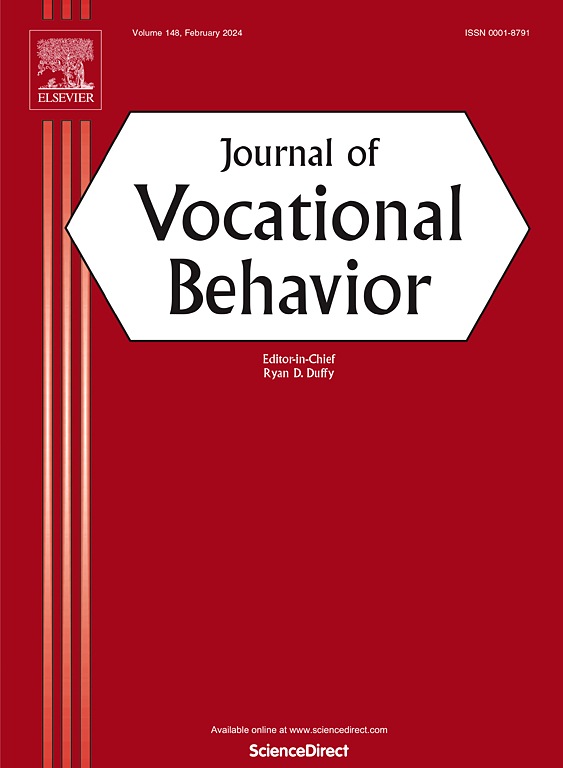Proactive coping and job insecurity among solo self-employed workers: Investigating a cyclic model with monthly measures
IF 5.2
1区 心理学
Q1 PSYCHOLOGY, APPLIED
引用次数: 0
Abstract
Job insecurity can harm workers' health and work performance. Adding to prior research that has mostly identified ways to minimize job insecurity among regular workers (e.g., employment protection legislation), the current research focusses on solo self-employed workers to investigate whether they can influence job insecurity by their own means. Based on proactive coping theory and conservation of resources theory, we propose a cyclic model in which proactive coping and job insecurity influence each other. We expect that more proactive coping during a month relates to less current job insecurity through the accumulation of career resources during the month and that current job insecurity relates to less proactive coping during the next month through psychological strain. We test whether trait self-compassion and recovery experiences mitigate this negative relationship of job insecurity via psychological strain with later proactive coping. The multi-level path modelling results from a 5-wave monthly survey study among 243 solo self-employed workers show that proactive coping during a month decreases current job insecurity via increased career resources. However, while current job insecurity positively related to current psychological strain, this strain was not related to proactive coping during the next month. We found some indication that trait self-compassion may weaken the negative relationship of job insecurity with psychological strain, but found no moderating role of recovery experiences. Instead, recovery experiences directly positively related to proactive coping. We recommend future researchers to further investigate our cyclic model and to sample less advantaged workers to gain better insight into potential loss cycles.
主动应对和独立个体经营者的工作不安全感:调查每月测量的循环模型
工作不安全感会损害员工的健康和工作表现。先前的研究主要确定了减少正规工人工作不安全感的方法(例如,就业保护立法),目前的研究将重点放在个体经营工人身上,以调查他们是否可以通过自己的方式影响工作不安全感。基于主动应对理论和资源保护理论,提出了一个主动应对与工作不安全感相互影响的循环模型。我们预计,在一个月内,通过职业资源的积累,更积极的应对与更少的当前工作不安全感有关,而当前工作不安全感与下个月通过心理压力而更不积极的应对有关。我们测试了自我同情特质和恢复经历是否通过心理紧张和随后的主动应对来缓解工作不安全感的负面关系。对243名个体经营者进行了为期5波的月度调查,多层次路径建模结果显示,在一个月内积极应对可以通过增加职业资源来降低当前的工作不安全感。然而,虽然当前的工作不安全感与当前的心理压力呈正相关,但这种压力与下个月的主动应对无关。本研究发现,自我同情特质可以减弱工作不安全感与心理压力的负向关系,但未发现康复经历的调节作用。相反,康复经历与积极应对直接相关。我们建议未来的研究人员进一步研究我们的循环模型,并对条件较差的工人进行抽样,以更好地了解潜在的损失周期。
本文章由计算机程序翻译,如有差异,请以英文原文为准。
求助全文
约1分钟内获得全文
求助全文
来源期刊

Journal of Vocational Behavior
PSYCHOLOGY, APPLIED-
CiteScore
13.10
自引率
5.40%
发文量
85
期刊介绍:
The Journal of Vocational Behavior publishes original empirical and theoretical articles offering unique insights into the realms of career choice, career development, and work adjustment across the lifespan. These contributions are not only valuable for academic exploration but also find applications in counseling and career development programs across diverse sectors such as colleges, universities, business, industry, government, and the military.
The primary focus of the journal centers on individual decision-making regarding work and careers, prioritizing investigations into personal career choices rather than organizational or employer-level variables. Example topics encompass a broad range, from initial career choices (e.g., choice of major, initial work or organization selection, organizational attraction) to the development of a career, work transitions, work-family management, and attitudes within the workplace (such as work commitment, multiple role management, and turnover).
 求助内容:
求助内容: 应助结果提醒方式:
应助结果提醒方式:


